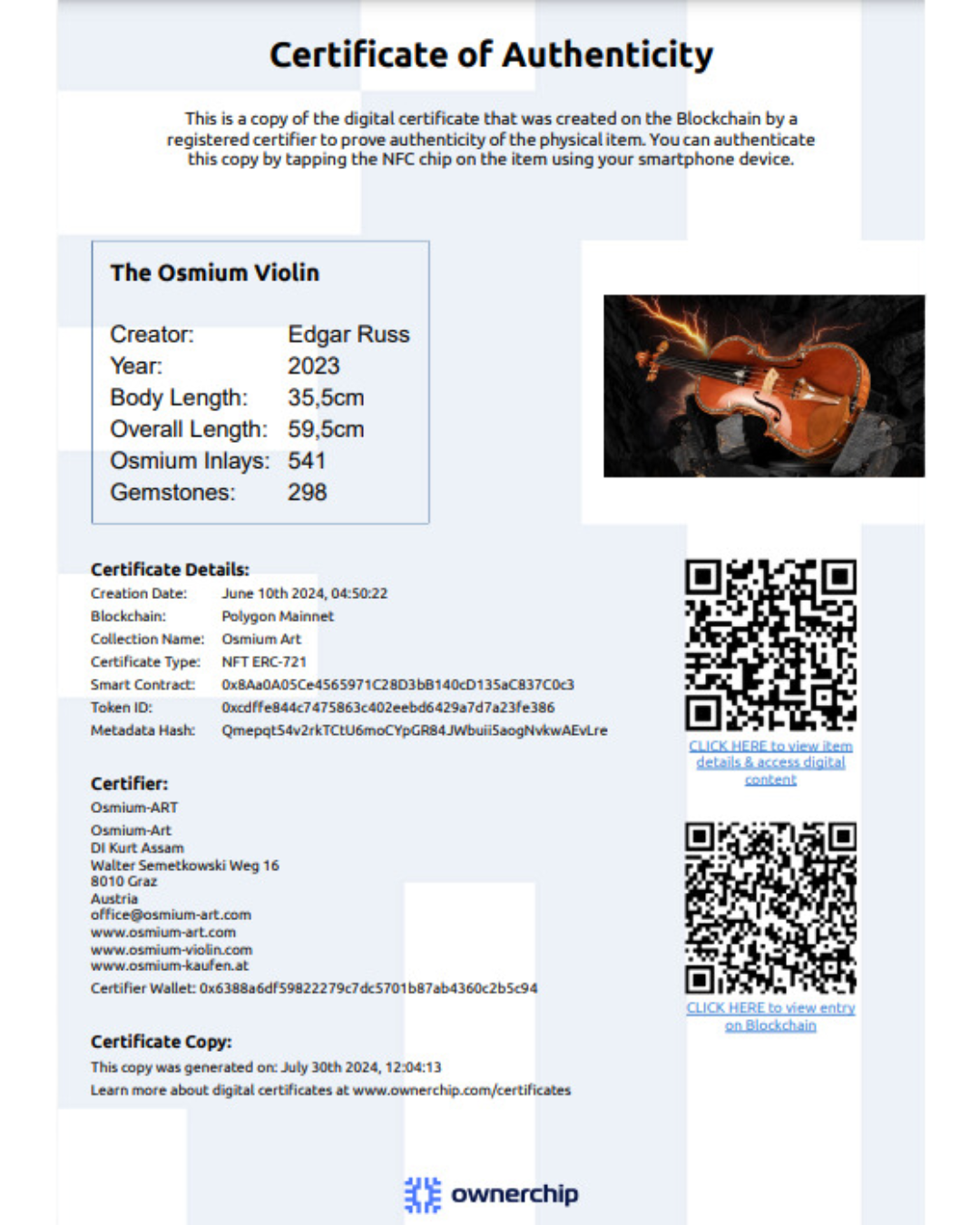What information does the digital certificate contain?
The digital certificate contains several key pieces of information, including the issuance date, certificate data, and technical data. The certificate’s metadata, such as the title, image, description, and traits, are stored on decentralized storage (IPFS) and are linked to the blockchain, ensuring transparency and security.
OwnerChip’s Digital Certificate
An OwnerChip digital certificate is a secure digital twin of a physical asset, providing
- Blockchain-secured storage
- Proof of authenticity
- Ownership verification
- Secure trading on resale marketplaces
- Trust & transparency in every transaction
How to verify the authenticity of your item?
To verify the authenticity of a physical item, download the OwnerChip App and tap the item’s NFC chip with your smartphone to access product details and certificate data. As the owner, you’ll also gain access to exclusive digital content.
How is the digital certificate stored?
The digital certificate is stored using a combination of blockchain technology and decentralized storage. Here’s how it works:
- Blockchain Storage: The unique ID of the digital certificate is stored on the blockchain. This ensures that the certificate’s existence and authenticity are securely recorded in an immutable ledger. The blockchain provides a transparent and tamper-proof record of the certificate’s ownership and transaction history.
- Decentralized Storage (IPFS): The detailed metadata associated with the digital certificate, such as the title, image, description, and traits, is stored on a decentralized storage system like the InterPlanetary File System (IPFS). IPFS ensures that the metadata is securely stored and can be accessed independently of any single entity. This data is not stored on the blockchain itself but is linked to it through the certificate ID.
- NFC Chip: The certificate also involves an NFC chip, which contains a private key used for signing and verifying the certificate. The private key on the NFC chip cannot be read or extracted, adding an additional layer of security.
This multi-layered approach ensures that the digital certificate is both secure and transparent. The blockchain provides a permanent, unalterable record, while IPFS ensures that the metadata is securely and efficiently stored. Together, these technologies protect against fraud and ensure that the digital certificate can be verified and trusted.

Trust
Enhances confidence in your assets by providing reliable and verifiable proof of authenticity
Convenience
Facilitates easy verification of authenticity with just a tap on your smartphone
Transparency
Provides clear ownership history & transaction records
Frequently Asked Questions
What are the benefits of using a digital certificate over traditional methods?
Security: They are tamper-proof and protected against fraud through cryptographic algorithms.
Transparency: Ownership history and transaction records are publicly accessible on the blockchain, providing full visibility.
Efficiency: Digital certificates streamline verification processes and reduce the need for intermediaries.
Interoperability: They are compatible with multiple services and platforms that support the Polygon blockchain.
Verification: Their authenticity can be easily verified by scanning the NFC chip.
How does blockchain ensure the security of my certificate?
Blockchain ensures the security of your digital certificate through cryptographic algorithms and decentralized network architecture. Each certificate is linked to a unique private key stored on an NFC chip, which cannot be read, extracted or changed. The certificate’s information is stored on a blockchain, making it tamper-proof and immutable. Any transaction or change to the certificate is transparently recorded on the blockchain, ensuring that the certificate cannot be forged or altered.
What platforms or applications support this digital certificate?
The digital certificate is compatible with any platform or application that supports the Polygon blockchain. It can be easily managed with our user-friendly OwnerCard for those with less Web3 experience or with over 300 digital wallets, ensuring broad compatibility and ease of use.
Can I transfer ownership of my digital certificate?
Yes, you can transfer ownership of your digital certificate. This can be done directly by transferring it to another digital wallet or an OwnerCard or trading it on web3 marketplaces like Rarible and OpenSea. The process involves a transaction on the blockchain, ensuring that the transfer is secure and transparent.
Can the digital certificate be revoked or invalidated?
Yes, a digital certificate can be revoked or invalidated under certain conditions. If it is proven that the certificate has been misused or if there is a legitimate reason to invalidate it, the certifier can revoke the certificate. The revocation process involves updating the status of the certificate on the blockchain, ensuring that all parties are aware of its invalidation.
How is my privacy protected?
Your privacy is protected by ensuring that only the wallet ID is publicly visible on the blockchain. The digital certificate itself contains metadata (title, image, description, traits) stored on decentralized storage (IPFS), which does not include personal information.